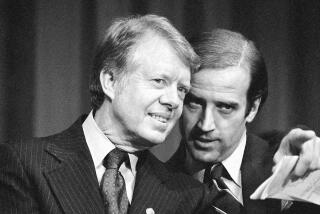Hard Words--With Smiles
- Share via
When foreign ministers of the United States, Canada and 33 European nations gathered in Finland last week for the 10th anniversary of the Conference on Security and Cooperation in Europe, the Soviet Union came under repeated and well-deserved criticism for flouting the human-rights provisions of the 1975 Helsinki accords. Human rights in the Soviet Union mean even less than when the agreement was signed. There is no sign that conditions will improve under Mikhail S. Gorbachev, the new Soviet leader.
Yet, as much as the Western democracies deplore the cruelties practiced by the Soviet government against its own people, they must live with the realities of the Nuclear Age. That means trying to restrain the competition in nuclear arms and to reduce the sources of friction that could endanger peace.
From this perspective, there was a bright note in the proceedings in Helsinki. The meeting marked the debut of Eduard A. Shevardnadze, who has replaced Andrei A. Gromyko as Soviet foreign minister, at a major international gathering.
Shevardnadze, in his public comments and private meetings with Secretary of State George P. Shultz and other Western officials, did not stray from the established Soviet line on arms control or any other area of dispute with the West. But he and his associates smiled a lot and said the same old things in a nicer, less confrontational style than was the norm with Gromyko.
The importance of atmospherics should not be exaggerated, but they are of consequence. Productive conversations between Soviet and U.S. officials became almost impossible in the invective-laden atmosphere that marked U.S.-Soviet relations for a time. The emergence of a better atmosphere at least opens the possibility of progress.
Shultz and Shevardnadze agreed on a broad agenda for the November summit meeting between Gorbachev and President Reagan--an agenda that includes the stalemated arms-control talks in Geneva, the Soviet invasion and occupation of Afghanistan, and such bilateral issues as civil aviation and cultural exchanges. The U.S. side will also insist on talking about human rights.
There were informal hints of more give-and-take from the Soviet side in the days before the Geneva arms-control negotiations recessed. Shevardnadze, in his formal address in Helsinki, said that the Soviet Union needs a “durable peace” to implement its “vast plans” for economic development at home.
The West must guard against reading too much into such statements. Certainly Gorbachev has said nothing to suggest a shift of resources away from the large and ravenous Soviet defense industry or a softening of its global role.
But caution is one thing, and a closed mind another. The Reagan Administration must remain open to the possibility that Gorbachev, for reasons of his own, may want and need a period of calm in relations with the United States--and that he will be more accommodating in order to get it.
More to Read
Sign up for Essential California
The most important California stories and recommendations in your inbox every morning.
You may occasionally receive promotional content from the Los Angeles Times.













